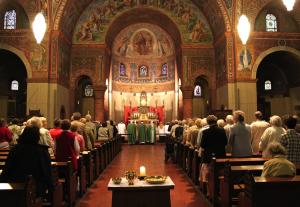The misuse of the faithful in the Synod of Synodality.
Recently, I wrote an article about the extreme content found in National Synthesis of the People of God in the United States of America for the Diocesan Phase of the 2021-2023 Synod. This “synthesis” appears to be an attempt by those who dissent from Church teaching to enact change. I contend that those who lead this effort seek to appeal to sensus fidelium in their attempt at doctrinal change. The thought: if it appears all the “faithful” throughout the world agree, the Pope must listen and move towards change. This is a misuse of the faithful.
In this article, I lay out why the “synthesis” represents an abuse of sensus fidelium. The supernatural sense of faith in sensus fidelium cannot contradict defined Church teaching. The attempt to do so represents a misuse not only of the concept of sensus fidelium, but also of the people of God.
Sensus Fidelium Explained
According to the Catechism of the Catholic Church, sensus fidelium must meet specific criteria. Sensus fidelium is not a mere consensus of Catholic opinion that in turn affects Catholic doctrine.
The supernatural sense of faith
91 All the faithful share in understanding and handing on revealed truth. They have received the anointing of the Holy Spirit, who instructs them and guides them into all truth.
92 “The whole body of the faithful. . . cannot err in matters of belief. This characteristic is shown in the supernatural appreciation of faith (sensus fidei) on the part of the whole people, when, from the bishops to the last of the faithful, they manifest a universal consent in matters of faith and morals.”
93 “By this appreciation of the faith, aroused and sustained by the Spirit of truth, the People of God, guided by the sacred teaching authority (Magisterium)…receives…the faith, once for all delivered to the saints…the People unfailingly adheres to this faith, penetrates it more deeply with right judgment, and applies it more fully in daily life.” [emphasis added]
Therefore, Magisterial teaching authority must guide sensus fidelium, not the other way round. Any attempt to reduce sensus fidelium to mere opinion, regardless of how many “faithful” hold an opinion, constitutes misuse.
Examples of Misuse
Allow me to provide proof of my contentions. Below is a direct quote that reference the concept of sensus fidelium for change in doctrine.
As one synodal consultation described, “People noted that the Church seems to prioritize doctrine over people, rules, and regulations over lived reality. People want the Church to be a home for the wounded and broken, not an institution for the perfect. They want the Church to meet people where they are, wherever they are, and walk with them rather than judging them; to build real relationships through care and authenticity, not superiority.” In no particular order, the following groups were frequently mentioned as integral to being a more welcoming Church.
The reference to a more “open” Church by the People of God later gets clarified as Catholics in the LGBTQ+ community.
Nearly all synodal consultations shared a deep appreciation for the powerful impact of women religious who have consistently led the way in carrying out the mission of the Church… Ordination for women emerged not primarily as a solution to the problem of the priest shortage, but as a matter of justice.
Notice that “nearly all synodal consultations” also means People of God. So, the inference here is that the People of God see the ordination of women as a matter of justice.
Invoking the Holy Spirit and the People of God
Moreover, in the final paragraph of the “synthesis,” we see a more direct reference to sensus fidelium.
Gratitude is a gift of the Holy Spirit, which is essential for authentic discernment. Throughout all the synodal consultations, the People of God have continually shared their expressions of joy and gratitude for the invitation to journey together on the synodal path. These spiritual conversations and fraternal dialogues have renewed a sense of common love and responsibility for the good of our Church—in our parishes, in our dioceses, and in our country. Through participation in the diocesan phase of the Synod, the People of God have already begun to build the Church for which they hope. Listening brings forth the impetus toward healing our enduring wounds, and enhancing our healthy communion and participation, which is vital for living out our mission. This synthesis, as well as the syntheses generated on the local level, are an invitation to ongoing attentive listening, respectful encounter, and prayerful discernment. [page 13]
Furthermore, the author’s use of the phrase the People of God in conjunction with the Holy Spirit shows their intent to invoke sensus fidelium to push for doctrinal change. Such a tactic, while more subtle in the US “synthesis,” is not so subtle in the other synod across the Atlantic, The Synodal Path in Germany.
Sensus Fidelium in The Synodal Path
In the document Women in ministries and offices in the Church, the authors directly reference sensus fidelium in their argument for women priests. The document states,
The daring recent beginning of a period of theological argumentation on the Synodal Path in Germany with regard to the participation of women in the sacramental ministry presupposes that the doctrinal texts currently available have not yet gone so far as to be finally binding. It should give pause for thought in the controversy surrounding this question that a large number of believers in Christ refuse to accept the assumption that only a man could preside over the Eucharistic liturgy because of his natural likeness to Jesus. The Second Vatican Council teaches that the “sensus fidelium” (“sense of faith of the faithful” as defined in Lumen Gentium 12) cannot err. [page 3]
The “large number of believers” referenced here appears to include those who drafted the US “synthesis.” The move of The Synodal Path of Germany by directly appealing to sensus fidelium confirms the tactic currently underway in the US. Clearly, the similarities between the Synod of Synodality and The Synodal Path are no accident. The intention to hijack sensus fidelium is clear.
Closing Thoughts
In conclusion, the movement to change Church doctrine through the misuse of the faithful or the People of God is here. Through a misguided appeal to sensus fidelium, dissenters within the Church see in the Synod of Synodality an opportunity for real doctrinal change. Doctrines concerning human sexuality and social justice (women’s ordination) appear as the primary targets. Those who wish for change, see Pope Francis’ call for synodality as the means to achieve their ends. If enough of the People of God demand change, the Holy Spirit must be speaking through them—so, their thought goes.
Allow me to squash these hopes by Pope Francis’ words from Episcopalis Communio.
During every Synodal Assembly, consultation of the faithful must be followed by discernment on the part of the Bishops chosen for the task, united in the search for a consensus that springs not from worldly logic, but from common obedience to the Spirit of Christ. Attentive to the sensus fidei of the People of God – “which they need to distinguish carefully from the changing currents of public opinion” – the members of the Assembly offer their opinion to the Roman Pontiff so that it can help him in his ministry as universal Pastor of the Church.
Did you get that? The synodal process needs to search for consensus not “from worldly logic” and “currents of public opinion,” in “obedience to the Spirit of Christ.” The document produced by the US appears heavy on worldly logic and public opinion and light on obedience to the Spirit of Christ. Let’s pray for correction.
Please click the link below to join.
Voices of the Faithful in the Synod on Synodality
Please make your voice heard.
I Support Church Teaching in the Synod of Synodality
Like and follow me on Facebook and Twitter.












